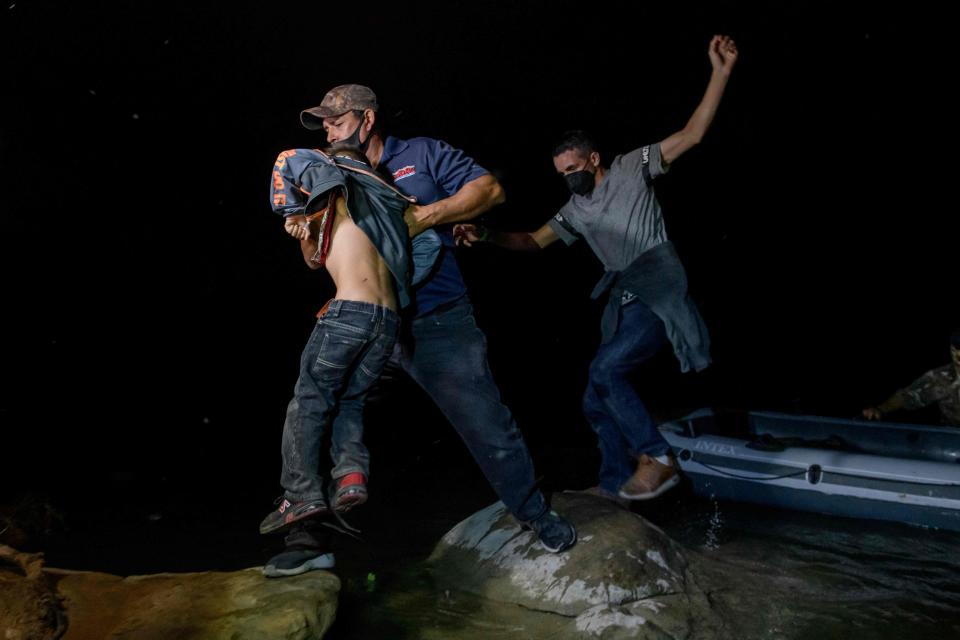We met injured, dehydrated, exhausted migrants at the border. Listen to their pleas.
How should we respond to the many migrants attempting to cross our southern border and enter the U.S.? What do we need to understand to respond in an educated, compassionate and responsible way? We are five health professionals who spent 10 days working as volunteers in a humanitarian migrant shelter at the Arizona-Mexico border. After speaking with hundreds of migrants, we offer these observations and thoughts.
The migrants we met were regularly dropped off at the border port of entry by U.S. Border Patrol despite being injured, dehydrated, starving or suffering from exhaustion and exposure. Some were traumatized by seeing the corpses of other migrants in the desert. Sweatshirts, backpacks, shoelaces and other personal items were taken by the U.S. border agents. Many had foot injuries so grave they could barely walk. We were often told they were not given food or water on the long bus ride back to a border crossing, and they were subjected to freezing air conditioning.
Who are the people seeking entry at our U.S. southern border? In our experience, they are individuals seeking a better life for themselves and their families. Most are young or middle-aged men, some are women. (Children and families are taken to a different port of entry.) They come from villages in the mountains of Guatemala or southern Mexico. They are fathers, sons, mothers, daughters and cousins.
Many have relatives living in the U.S. Many are farmers who can barely feed their families on their small plots of land. Many have had their land taken away by multinational agribusiness. There are no jobs. Many were threatened by gangs who wanted protection money or loyalty, and they and their families were subjected to violence. In short, the migrants are desperate to flee violence and poverty and to reunite with family.
Racism isn't relegated to the past: I am a Black Republican. Here's what my party should know about racism in America.
Why would thousands choose to leave the familiar homes of their upbringing and ancestors? These individuals seek freedom from hunger, poverty and oppression, but most of all from hopelessness. They are desperate enough to believe the lies of cartel “travel agents” to whom they pay thousands of dollars; endure the demeaning control of coyotes; and risk their lives by walking for days through stifling deserts and waves of mountains.
Many feel fortunate to begin at the bottom here, because that is better than the alternative. Some have skilled professions. Many work here awhile, save money, and return to their home communities south of the border. Some try making a life here and hope for an elusive green card. For most, the choice is dictated by the desire to reunify their families in one place for a better life.
Opinions in your inbox: Get the best insights and analysis delivered to your inbox
Experience has demonstrated that migrants are motivated to work hard and avoid trouble. They spend, support businesses, and start their own. They pay taxes, enroll their children in schools, revitalize homes and neighborhoods, support communities and make our country a better place.

People frequently point to the unlawful entry of migrants into our country. “Why don’t they just follow our rules?” The reality is that our current immigration rules and laws do not provide them opportunities, either because of severe restrictions in numbers or eligibility. We need to concede that U.S. policies, arms and military training that support autocratic leaders, and economic interests of U.S. multinational corporations contribute to the problems of Central America and Mexico that force migrants to leave.
Charles C.W. Cooke in USA TODAY: Democrats' spending plans don't show any signs of sanity
Migrants we met ask for just a few things. They ask to be treated humanely and not as criminals hunted down in our Southwest deserts. They ask for opportunities to work jobs unfilled here in the U.S. so they can feed their families. They ask to be reunited with their families and loved ones. Compassionate responses would include more humane border patrol procedures, a boost in temporary work visas, and fairer access to permanent resident status.
In the end, we are talking about how we treat our neighbors with whom we share an increasingly shrinking planet. Do we treat them as fellow humans in need? Do we recognize them as contributors to the good of our society? Do we acknowledge that we should have a more understanding and just response to their plight? In the end, we decide who we are.
Dr. Joseph Marino of Green is a retired physician with years of public health experience in Central and South America. This guest column was also signed by Kathy Ress of Cuyahoga Falls, Deborah Marino of Green, Janet Alberti of Chicago (formerly of Akron) and Susan Gallagher of Akron. This column originally published in the Akron Beacon Journal.
You can read diverse opinions from our Board of Contributors and other writers on the Opinion front page, on Twitter @usatodayopinion and in our daily Opinion newsletter. To respond to a column, submit a comment to letters@usatoday.com.
This article originally appeared on Akron Beacon Journal: Immigration: Why are migrants crossing the border? They told us.

